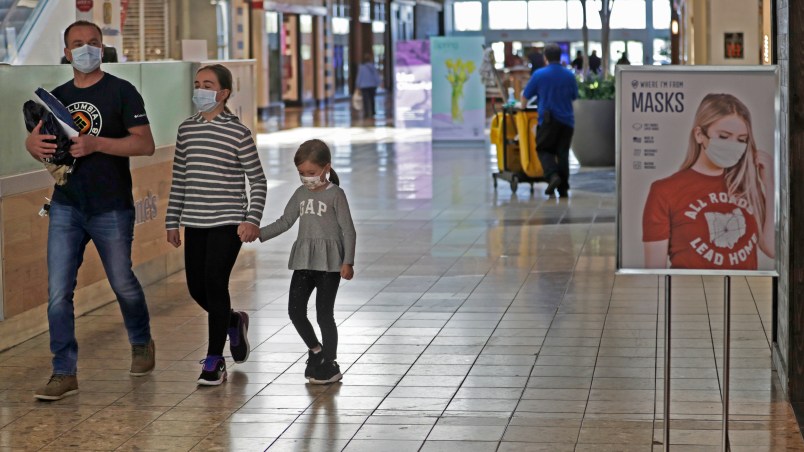BALTIMORE (AP) — U.S. retail sales tumbled by a record 16.4% from March to April as business shutdowns caused by the coronavirus kept shoppers away, threatened stores across the country and weighed down a sinking economy.
The Commerce Department’s report Friday on retail purchases showed a sector that has collapsed so quickly that sales over the past 12 months are down a crippling 21.6%.
The sharpest drops from March to April were at clothiers, electronics stores, furniture stores and restaurants. A long-standing migration of consumers toward online purchases is accelerating, with that segment posting a 8.4% monthly gain. Measured year over year, online sales surged 21.6%.
For a retail sector already reeling from the migration of consumers to online shopping and to app-based delivery services, a back-to-back free-fall in spending poses a grave risk. Department stores like Neiman Marcus and J.Crew have filed for bankruptcy protection. Hotels, restaurants and auto dealerships are in danger.
An April analysis by a group of academic economists found that a one-month closure could wipe out 31% of non-grocer retailers. A four-month closure could force 65% to close.
The plunge in retail spending is a key reason why the U.S. economy is contracting. Purchases at retailers are a major component of overall consumer spending, which fuels about 70% of economic growth.
Other than online, not a single retail category was spared in April. Auto dealers suffered a monthly drop of 13%. Furniture stores absorbed a 59% plunge. Electronics and appliance stores were down more than 60%.
Retailers that sell building materials posted a drop of more than 3%. After panic buying in March, grocery sales fell 13%.
Clothing-store sales tumbled 79%, department stores 29%. Restaurants, some of which are already starting to close permanently, endured a nearly 30% decline despite shifting aggressively to takeout and delivery orders.
With few Americans shopping, traveling, eating out or otherwise spending normally, economists are projecting that the gross domestic product — the broadest gauge of economic activity — is shrinking in the April-June quarter at a roughly 40% annual rate. That would be the deepest quarterly drop on record.
Spending tracked by Opportunity Insights suggests that consumer spending might have bottomed out around mid-April before beginning to tick up slightly, at least in the clothing and general merchandise categories. But spending on transportation, restaurants, hotels and arts and entertainment remains severely depressed.
Credit card purchases tracked by JPMorgan Chase found that spending on such necessities as groceries, fuel, phone service and auto repair declined 20% on a year-over-year basis. By contrast, spending on “non-essentials,” such as meals out, airfare and personal services like salons or yoga classes, plummeted by a much worse 50%.







Part of the reason states are opening up earlier than they should (and I am including blue counties and blue states as well) is because they have no faith that Trump will do anything to help on testing/PPE/contact tracing and there is no faith that the federal gov’t will get financial aid to folks who need it in a timely manner.
State Governors see these stats about closures and they’re like ‘screw it, as long as the hospitals won’t get overrun we should move to open as carefully as we can knowing there are real risks in doing so’. It’s not an irrational decision. It is being forced upon them by Trump’s incompetence, and that of the hand of Trump, the equally dumb and venal Jared Kushner.
Another thing to note is that these are real drops despite movement to online sales. We’re sort of in a classic textbook example that one might’ve read about in a college Econ class about a ‘crisis of confidence’. This is a failed economy and it won’t come back without strong federal leadership. Absent that, the path that Cuomo has charted is the most fundamentally sound model for states to use to return to a functional economy.
tRump keeps saying he built the greatest economy the world has ever seen. Not even close. He inherited a great economy, just like he inherited all that money from his daddy who put millions in his pockets. tRump then proceeded to blow it all away, one bankruptcy after another until he figured out how to get into the money laundering business and snooker the regulators in the real estate markets. Btw, this is a man that has probably never paid taxes on most of his worth and we still haven’t seen his fucking taxes.
That’s what he’s done with our economy in his failure to deal with this pandemic. He will continue to wreck the economy. Even if we regain some employment leading to some sales in retail, it will not be enough by November to get us back to where we need to be, nor is he the one or any of his flunkies, who knows how to do that. This is what American Carnage looks like.
I think that you are leaving out the loss in sales tax revenue as a factor in why states want to open up, along with not wanting to pay unemployment benefits.
As I mentioned earlier this week that it was either in Congress or the MO state legislature that wanted to tax all internet sales. The taxing rate would be at the state set level not the local level. As far as I know it never moved forward.
“Please excuse our mess, but we are still open for business!”